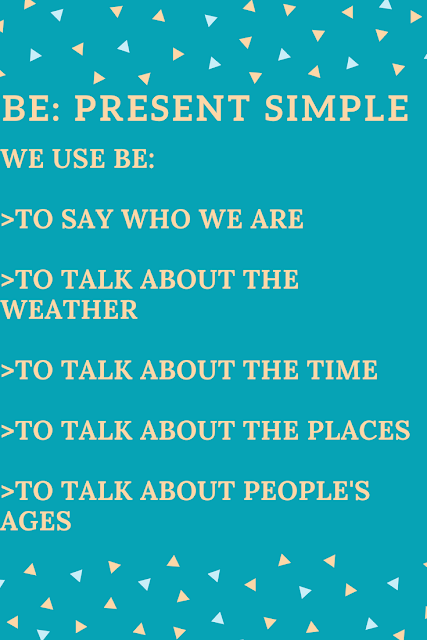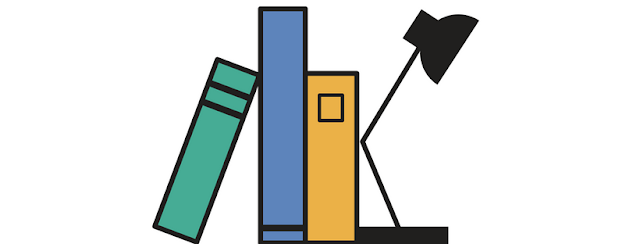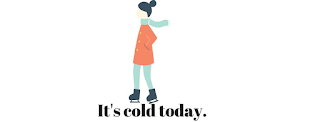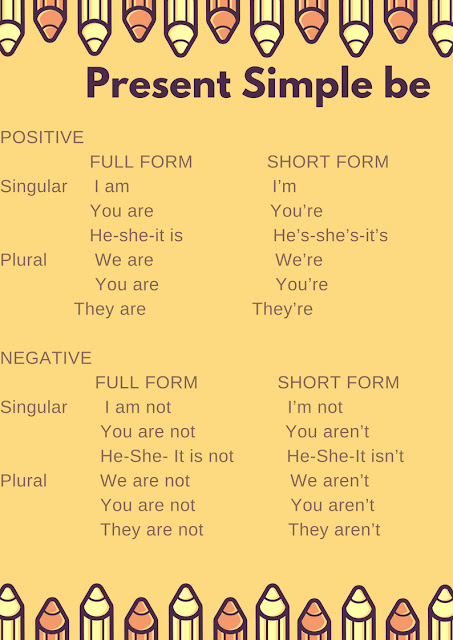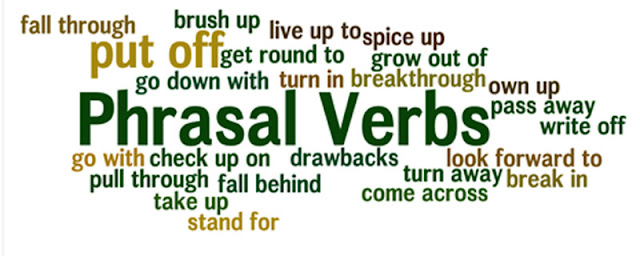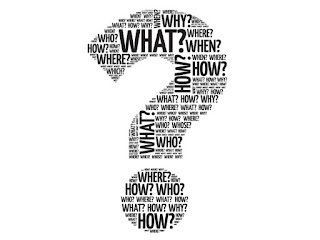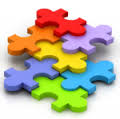sábado, 23 de junho de 2018
sexta-feira, 22 de junho de 2018
PRESENT SIMPLE
Here are some examples of be in the Present Simple:
This is my brother . He's ten years old.
I'm a student. These are my books.
They aren't at home. They're at the theatre.
>In speech, we usually use the short forms:
She's my sister. He's my brother.
I'm from Italy. They're German.
>>We use be:
>To say who we are:
I'm Steve and this is my friend Bill. We're from Scotland.
I'm Janet and these are my sisters. This is Sandra and this is Patricia. Sandra and Patricia are doctors.
>To talk about the weather:
It's cold today.
It's a beautiful day.
It's usually hot here.
It isn't very warm today.
>To talk about the time:
It's ten o'clock.
It's half past four.
You're late!
>To talk about places:
Milan is in the north of Italy.
John and Mary are in Yorkshire.
>To talk about people's ages:
My sister is six years old.
quinta-feira, 21 de junho de 2018
terça-feira, 12 de junho de 2018
PHRASAL VERBS
Write down - anotar
"She wrote down every word the teacher said."
Find out - descobrir/ achar
"I found out what was troubling her"
Grow up - crescer
"I'm going to be an engineer when I grow up."
Dive off - escapar de/ mergulhar
"She dived off a rock into the sea."
Fall in love - apaixonar-se
"He falls in love with each new secretary."
Be in touch with - comunicar-se/ ter noticias
"I haven't been in touch with my friends from High School."
Keep-in touch - manter contato
"Keep in touch with me when you return to France."
Look for - procurar
"I looked for my lenses but I couldn't find them."
Go back - voltar
"Let's go back for a minute to what we were talking about earlier."
Get along with - relacionar-se/ entender-se
"The children just cannot get along together."
Hit it off - entender-se bem
"We hit it off as soon as we met."
End up - acabar
"I knew that he would end up in prison."
Drift apart - separar-se
"European and Brazilian politics seem to be drifting apart."
Count-on - esperar apoio
"They count on their parents for leadership and love."
Be up to - estar a fim de
"I'm up to go out."
Take care - cuidar-se
"Take care or you will fall."
PHRASAL VERBS
Go down - descer/ diminuir/ ser lembrado
"His bravery will go down in history."
Get better - sarar/ melhorar
"John's grades got better after taking private classes."
Be or get stuck - ficar preso (transito, elevador, etc.)
"It had rained all night on the farm, so he got stuck in the mud."
Take off - levantar voo, decolar/ tirar a roupa
"Take off your shoes as soon as you get into a Japanese house."
Run away from - escapar/ fugir
"He ran away with all her money."
Wake up - acordar
"The baby woke up in the middle of night."
Run into - encontrar por acaso
"Yesterday I ran into a wallet on the sidewalk."
Cross out - eliminar, tirar fora
"Cross out the first two names on the list."
terça-feira, 10 de abril de 2018
AT HOME
Rooms 🏡
Houses and flats are usually divided into rooms. You use each room for a particular purpose. The main rooms in a house are the bedroom, the bathroom, the kitchen, the living room, and sometimes the spare room, the dining room, the utility room and the study. The garage is the place where you keep your car.
You sleep in a bedroom. If you have a spare room, guests and friends who come to stay with you sleep in it. You wash yourself in a bathroom. You have your meals in a dining room or your kitchen. You relax, e.g. listen to music, read books, chat with friends, watch TV, etc. in a living room. You work in a study. You cook food and wash dishes in a kitchen. You park your car in a garage. Some houses and flats have halls or hallways. These are by the front door. You often hang coats in a hall. When people come to the door, e.g. people you don't know, you might ask them to wait in the hall.
Verbs
You use the verb do (not make) with many everyday tasks, e.g. housework.Note that you use make with certain nouns, e.g. make a meal, make a bed. You use the verb have with shower, bath and meals.
I don't like doing housework. not making housework
I have to do the ironing twice a week. not making the ironing
You made a lovely meal for us last night. Shall I make the bed?
I'm having a shower. Let's have lunch.
You wash yourself and you wash your hands (not the hands).
Go and wash your hands - they're dirty. I washed my face.
> You use the verb go and the preposition to with bed and sleep.
I went to bed too late last night. She goes to sleep very quickly.
Prepositions
When you're in your house or flat, you say that you are at home. However, you say that you're in a room.
Will you be at home tomorrow?
Where's Pete? He's in the kitchen.
quinta-feira, 15 de março de 2018
Who, what, wich
Who, what, which
1) Nos usamos who para perguntar pessoas:
A: Who are you going to visit?
B: I’m going to visit my sister.
Who did Maria invite to her party?
2) Nos usamos what and which to ask about things:
What film did you see at the cinema?
Which newspaper do you want, The Times or the Daily Telegraph?
Nos geralmente usamos What quando tem várias possíveis respostas:
What's her name? (existem varias possibilidades de respostas)
Normalmente nos usamos which quando tem uma pequena possibilidade de respostas:
Which do you want to do: stay home or go to the movies?
3) Quando nos formamos pergunta, geralmente nos colocamos
Who is the president of Peru ?
Who can speak Chinese?
Who did you meet at the party?
What’s the capital of India? – New Delhi.
What’s she doing?
What was the name of your teacher?
What does your father do?
Which car will you buy, the Fiat or the Ford?
Which shirt do you prefer, the red one or the blue one?
_____________________________________________
Explanation
Who -> Person
Where -> Position, Place
When -> Time, Occasion, Moment
Why -> Reason, Explanation
What -> Specific thin, Object
Which -> Choice, Alternative
How -> Way, Manner, Form
sexta-feira, 16 de fevereiro de 2018
Where, when, why, how
Where, when, why, how
Where, when, why e how são question words. Veja abaixo como podemos usa-las:
Where
Nos usamos where para perguntar sobre lugares:
Where is João? - He's at home.
When
Nos usamos when para perguntar sobre datas e horários:
When will you phone? - At six o'clock.
Why
Nos usamos why para perguntar sobre por que de alguma coisa:
Why is Maria taking a taxi? - Because her car isn't working.
How
Nos usamos how para perguntar de que forma ou de que maneira (in what way?):
How did he get to Brighton? - He went by train.
Nos podemos usar how para perguntar se a pessoa esta bem:
Hello. How are you? - I'm fine, thanks.
Como fazer perguntas com where, when, why, e how
Nas perguntas com be, nos colocamos o sujeito depois do be (arrumar!!!!)
be+ subject
Why is João angry?
Where are they?
Why is he here?
Nas perguntas com o verbo auxiliar (will, is, are, can, must, etc.), nos colocamos o sujeito depois do verbo auxiliar:
verb +subject + verb
Why are they leaving?
How will she get there?
When will you phone?
Nas perguntas com Present Simple ou Past Simple, nos usamos o do antes do sujeito:
do + subject + verb
Where does she live?
Why did you phone the police?
Where did he live?
Guys, estou disponibilizando para quem quiser baixar os exercícios e também a vou postar as respostas no domingo. Bom estudo!!!
Grammar Exercises – Wh questions
1. Choose the correct question words:
where, who, how, when, why |
a._____ do you live?
b._____ ‘s that girl?
c._____ do you go to school?
d._____ do banks open?
e._____ are you wearing that coat?
2. Write questions about the words in brackets:
a. They went to Spain - _______________________?
b. He writes novels - _______________________?
c. Lacy likes soccer - ______________________?
d. The girls watched a serial - _________________?
e. He discovered the truth - ___________________?
______________________________________________________________________
Respostas:
a) Where b) Who c) How d)When c) Why
a)Where did they go?
b)What does he write?
c)Who likes soccer?d)What did he discover?
______________________________________________________________________
Respostas:
a) Where b) Who c) How d)When c) Why
a)Where did they go?
b)What does he write?
c)Who likes soccer?d)What did he discover?
quarta-feira, 14 de fevereiro de 2018
Happy Valentine's Day
Valentine's Day in the United States
Valentine's Day is celebrated on February 14. It is a festival of romantic love and many people give cards, letters, flowers or presents to their spouse or partner. They may also arrange a romantic meal in a restaurant or night in a hotel. Common symbols of Valentine's Day are hearts, red roses and Cupid.
What Do People Do?
Many people celebrate their love for their partner by sending cards or letters, giving gifts or flowers and arranging meals in restaurants or romantic nights in hotels. People who would like to have a romantic relationship with somebody may use the occasion to make this known, often anonymously. Valentine's cards are often decorated with images of hearts, red roses or Cupid. Common Valentine's Day gifts are flowers chocolates, candy, lingerie and champagne or sparkling wine. However, some people use the occasion to present lavish gifts, such as jewelry. Many restaurants and hotels have special offers at this time. These can include romantic meals or weekend breaks.
Public Life
Valentine's Day is not a public holiday. Government offices, stores, schools and other organizations are open as usual. Public transit systems run on their regular schedule. Restaurants may be busier than usual as many people go out for an evening with their spouse or partner. Valentine's Day is also a very popular date for weddings.
Background
There are a number of Saints called Valentine who are honored on February 14. The day became associated with romantic love in the Middle Ages in England. This may have followed on from the Pagan fertility festivals that were held all over Europe as the winter came to an end. Traditionally, lovers exchanged hand written notes. Commercial cards became available in the mid nineteenth century.
Symbols
The most common Valentine's Day symbols are the heart, particularly in reds and pinks, and pictures or models of Cupid. Cupid is usually portrayed as a small winged figure with a bow and arrow. In mythology, he uses his arrow to strike the hearts of people. People who have fallen in love are sometimes said to be 'struck by Cupid's arrow. Other symbols of Valentine's Day are couples in loving embraces and the gifts of flowers, chocolate, red roses and lingerie that couples often give each other.
segunda-feira, 12 de fevereiro de 2018
Common Collocations
Hello guys, estou disponibilizando um arquivo com Common
Collocations.
para baixar o arquivo clique no link:
Assinar:
Postagens (Atom)
-
Phrasal verb walk Phrasal verb walk citados no video: Walk off Walk away Walk out Walk in on Walk into Walk ov...
-
Aeroporto Onde posso fazer o check in? - where can I make my check in? Onde posso comprar passagens? - Where can I buy tic...
